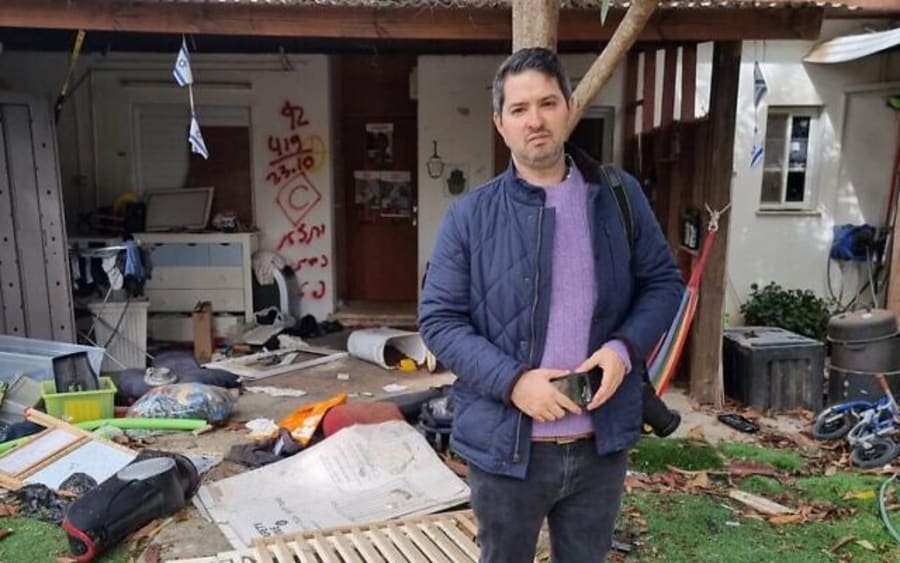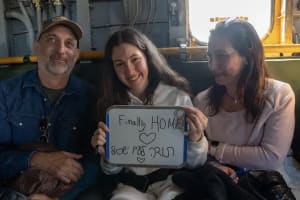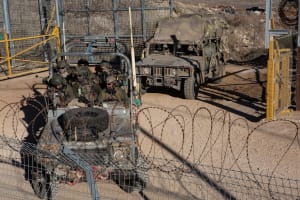Newly-established venture capital fund wants to invest in lifesaving Israeli tech amid Gaza war
United States-Israel Business Alliance President Kaplowitz: 'What’s inspiring and encouraging to me is the resilience' of Israel's tech workforce

American venture capitalist and president of the United States-Israel Business Alliance, Aaron Kaplowitz, wants to invest capital in the Jewish state during the war between Israel and Hamas in Gaza and launched a new VC fund in October to do just that.
1948 Ventures, named for the year Israel gained its independence and became a nation, was established just days after the Oct. 7 massacre in which Hamas murdered 1,200 people and kidnapped more than 240 hostages from southern Israel into Gaza.
The organization was launched by the United States-Israel Business Alliance in the middle of Israel’s war in Gaza to reaffirm Israel’s position as a tech powerhouse.
Kaplowitz said 1948 Ventures was already months in the making but announced its plans now as a commitment to the region, despite its difficulties.
“It was very clear to me early on that the startup community would take a big hit and that there’s going to be a lot of pain, so there was going to be a lot of need to get capital,” Kaplowitz told the Times of Israel during his second trip to Israel since the war broke out.
“When capital is needed, there are good opportunities for investments,” he added.
1948 Ventures will focus on investing in lifesaving technology and Kaplowitz says he wants to invest $100,000 to $1 million in early-stage companies founded by Israelis that focus on dual-use technology, with military and civilian applications.
Given the urgency of the war, some technologies may have been created for civilian uses but now are experiencing real-time testing grounds on the battlefield, according to Ctech by Calcalist.
During Kaplowitz's current trip to Israel, he has already met with more than 25 startups, with some based in the south of the country, including in Sderot and Beersheva.
“A lot of what we are looking at now is literally lifesaving technology and we are focused on the companies that have the most urgent application to save lives,” he said
“I met with a company where their CTO is in an army tank unit in Gaza and he happens to be working on a technology that could be really helpful to protecting his unit and other soldiers. So, you can imagine that when he comes out of the military, he has seen exactly what the application can be, and he is motivated to get that technology back into the battlefield,” Kaplowitz explained.
Kaplowitz, who flew to Israel from his New York offices less than 10 days after the Oct. 7 massacre, says he felt the country was going through a “national PTSD.”
“I met with a number of companies who had commitments or offers – mostly from international investors –that once October 7th happened, those commitments were delayed, put on hold, or just canceled. Those are the most painful ones to hear about because those companies were on the cusp of getting much-needed capital injections,” he said.
Kaplowitz also commented on the fact that while many tech employees were among the 350,000 reservists that were called up by the Israeli army, disrupting the business operations of thousands of companies in the country, Israelis are strong and trying to work around it.
“Technology that people are working on here is incredible, which obviously doesn’t necessarily translate into a good investment,” Kaplowitz noted.
“But what’s inspiring and encouraging to me is the resilience that everyone is trying to snap back to work even though a lot of the companies we are meeting with have large percentages of their workforce on reserve duty or helping out in other areas. The Israeli tech community is really amazing at figuring out how to patch up those holes for those absences,” he said.
Kaplowitz added that his presence in Israel was also meant to signal to the venture community that investing in Israel is a viable opportunity.
“Part of the reason I’m here is also to signal to the venture community in the U.S. that if they’re thinking of giving up on Israel right now – they are missing out on opportunities,” Kaplowitz said.
He hopes to organize a group of investors to come to Israel in the coming months to find new investments.
“I don’t want to tell anyone to come to a war zone who is not ready or prepared but at the same time, I feel very comfortable and safe moving around here – and hopefully I can help push other investors to visit,” Kaplowitz said. “As I tell my friends: Israel is really safe, except for the ongoing war.”

The All Israel News Staff is a team of journalists in Israel.













